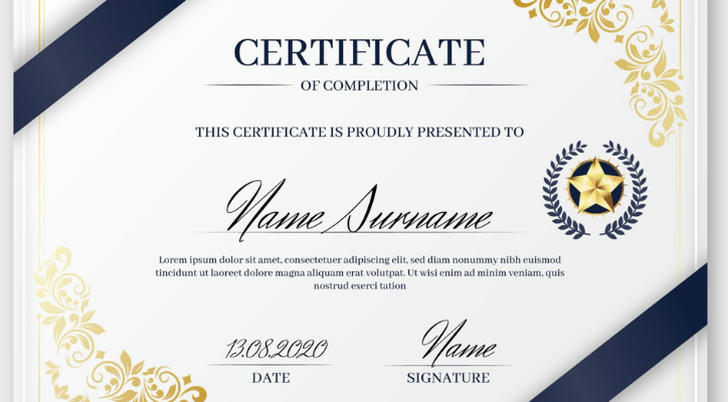How to Maintain and Update Your Professional Certifications: A Guide for Career Growth
In today's fast-paced and ever-evolving job market, staying ahead of the competition is crucial for career success. One of the best ways to do this is by maintaining and updating your professional certifications. Whether you're a healthcare worker, IT specialist, or project manager, keeping your certifications up to date is vital to demonstrating your expertise, credibility, and commitment to professional development. But how do you ensure your certifications stay current and relevant? In this article, we’ll explore the importance of updating certifications, provide real-life examples, and offer solutions for maintaining your qualifications in a rapidly changing professional landscape.

Why It’s Important to Update Your Professional Certifications
- Industry Standards Evolve
Certifications are often based on the latest industry standards, technologies, or regulations. In fields like healthcare, finance, or technology, practices and tools evolve quickly. For example, medical certifications may require knowledge of new treatment protocols, while IT certifications might need to reflect the latest software developments. If your certification isn’t updated regularly, you risk becoming outdated in your field, which could affect your career growth.
- Competitive Advantage
In competitive job markets, employers often prioritize candidates with the most current qualifications. For example, IT professionals with the latest certifications in cloud computing or cybersecurity are more likely to be hired or promoted. Staying current shows employers that you are dedicated to your profession and are willing to invest in your skills.
- Legal and Regulatory Compliance
In some industries, like healthcare and finance, certain certifications are required by law to ensure professionals meet the minimum regulatory standards. Without up-to-date certifications, you could face legal consequences or be barred from working in specific roles. For instance, healthcare professionals must maintain certifications like Basic Life Support (BLS) or Advanced Cardiovascular Life Support (ACLS), which need to be renewed every few years.
- Personal Development and Confidence
Keeping your certifications current not only helps you stay relevant in your field but also contributes to your personal growth. Learning new skills or updating existing ones boosts your confidence, enhances your job performance, and prepares you for new challenges.

Case Studies: Real-World Examples of Maintaining Certifications
Case 1: Healthcare Professional – The Importance of Continuing Education
Maria, a registered nurse (RN), works in a busy hospital emergency room. Her certification for Basic Life Support (BLS) was initially awarded when she graduated nursing school, but after several years, she realized her certification was close to expiring. Maria’s hospital has strict requirements for employees to maintain up-to-date certifications, and she knew that failing to renew could limit her career opportunities.
Maria took the hospital’s in-house refresher course, which updated her on the latest emergency medical protocols and practices. Not only did this ensure she remained compliant with hospital policies, but it also gave her the confidence to handle medical emergencies more effectively. In fact, her updated BLS certification helped her secure a promotion to a supervisory role, as her expertise was valued for leadership positions.
Case 2: IT Professional – The Need for Cybersecurity Certifications
John is an IT professional specializing in network administration. He had been working in the industry for over a decade, and his certification in CompTIA Network+ had served him well for many years. However, as cybersecurity threats increased, John realized he needed to update his skills to stay competitive.
John enrolled in an online course for the Certified Information Systems Security Professional (CISSP) certification. This certification not only enhanced his knowledge of modern security practices but also opened doors to higher-paying roles in the cybersecurity field. By investing time in maintaining and updating his certifications, John ensured that his career remained on an upward trajectory.

Solutions for Maintaining and Updating Your Certifications
1. Know the Renewal Requirements
Every certification has specific renewal guidelines, often set by the certifying body. These might include taking continuing education courses, attending conferences, or passing periodic exams. The first step in maintaining your certification is understanding these requirements and keeping track of renewal deadlines. Many certifying bodies offer online portals where you can check your status and get reminders about renewal dates.
2. Leverage Online Learning and Webinars
One of the easiest ways to meet continuing education requirements is by participating in online courses or webinars. Platforms like Coursera, Udemy, and LinkedIn Learning offer certifications in a wide range of industries. For example, project management professionals can earn Professional Development Units (PDUs) through online workshops that count towards maintaining the Project Management Professional (PMP) certification.
For IT professionals, vendors like Cisco, Microsoft, and AWS (Amazon Web Services) offer on-demand courses and exams to help you stay updated with the latest technologies. These platforms often provide flexibility, allowing you to learn at your own pace while continuing to work full-time.
3. Attend Conferences and Networking Events
Conferences are an excellent way to gain new insights into your field and maintain your certification. For example, project management professionals can earn PDUs by attending industry conferences like PMI Global Congress. These events not only provide the opportunity to learn about new trends but also allow you to network with peers and industry leaders, which can help with career growth.
In the healthcare industry, attending medical conferences or workshops often provides the latest insights into best practices and treatment protocols. These events are an excellent way for professionals to ensure they are on the cutting edge of their field.
4. Join Professional Associations
Many professional associations offer resources, seminars, and webinars to help members maintain their certifications. For example, the Project Management Institute (PMI) provides resources for those who hold the PMP certification. Similarly, organizations like the American Nurses Association (ANA) provide continuing education opportunities for nurses to maintain licensure and certifications.
Joining a professional association also offers the benefit of staying connected with others in your field. This can be invaluable when looking for new career opportunities or navigating changes in industry standards.
5. Set Reminders and Plan Ahead
Finally, setting reminders for certification renewals is essential. Use digital tools such as Google Calendar or certification management apps to track deadlines and stay on top of renewal requirements. By planning ahead, you can avoid last-minute scrambling and ensure that your certifications are always up to date.

Conclusion
Maintaining and updating your professional certifications is not just about meeting industry standards; it’s about ensuring your career remains dynamic and competitive. With industries rapidly evolving, updating your qualifications through continuing education, online learning, attending conferences, and joining professional organizations will ensure you stay relevant and in demand. Whether you're in healthcare, IT, or project management, ongoing professional development is key to long-term success. By following these strategies and being proactive about your certification maintenance, you can secure a fulfilling, upward-moving career.
